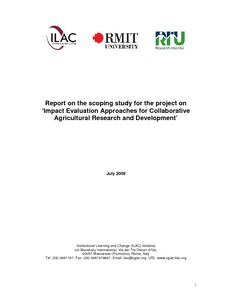Report on the scoping study for the project on ‘Impact Evaluation Approaches for Collaborative Agricultural Research and Development’
In response to calls for new approaches for evaluating the impact of agricultural research and development programmes, and to the need to improve the impact of these programmes to meet the global demand for greater food security, a scoping study was conducted to provide a basis for a project on ‘Impact Evaluation Approaches for Collaborative Agricultural Research
and Development’.
Coordinated by the Institutional Learning and Change (ILAC) Initiative, an Inter-Centre Initiative hosted by Bioversity International, in collaboration with the Royal Melbourne Institute of Technology (RMIT), an Australian university, and Research Into Use (RIU), a programme funded by the UK Department for International Development (DFID), the study
sought to follow up on the findings of an international workshop on ‘Rethinking Impact: Understanding the Complexity of Poverty and Change’, held in Colombia in March 2008. Research Into Use provided two small grants totalling $76,000 to support the scoping study and other collaborators provided in-kind contributions for staff time, as well as an additional estimated amount of $10,500 from the ILAC budget (provided through a grant from the Dutch Ministry of Foreign Affairs; DGIS) for consultancy fees and travel. High on the list of findings was the need to develop ways of evaluating the impact of complicated programmes that involve a range of institutions, disciplines, situations, methodologies and goals, and complex programmes which are emergent and responsive to changing needs and opportunities. Such programmes are becoming the norm in the field of
agricultural research and development, but the approaches used to evaluate their impact tend to be based on those used for the simple programmes predominant in the 1960s and 1970s which usually focused on crop improvement. Within the Consultative Group on International Agricultural Research (CGIAR), crop improvement programmes now account for only about
25% of the CGIAR research centres’ work, and the need for methodologies suited to evaluating the impact of complex programmes has become imperative.
The scoping study for the proposed impact evaluation project lasted from September 2008 to May 2009 and involved conducting a series of activities. These included:
• reviewing existing methodologies and other resources
• documenting the current status of impact evaluation in the CGIAR system
• conducting interviews with key informants
• identifying potential donors
• identifying and assessing possible case studies
• developing a design for the project
• preparing a funding proposal to submit to donor agencies
A proposal for funding the project, specifically for researching impact evaluation and developing methodologies over a 4-year period, was submitted to the International Fund for Agricultural Development (IFAD) in April 2009. The interest of other donors will continue to be investigated in order to scale up the project activities.

